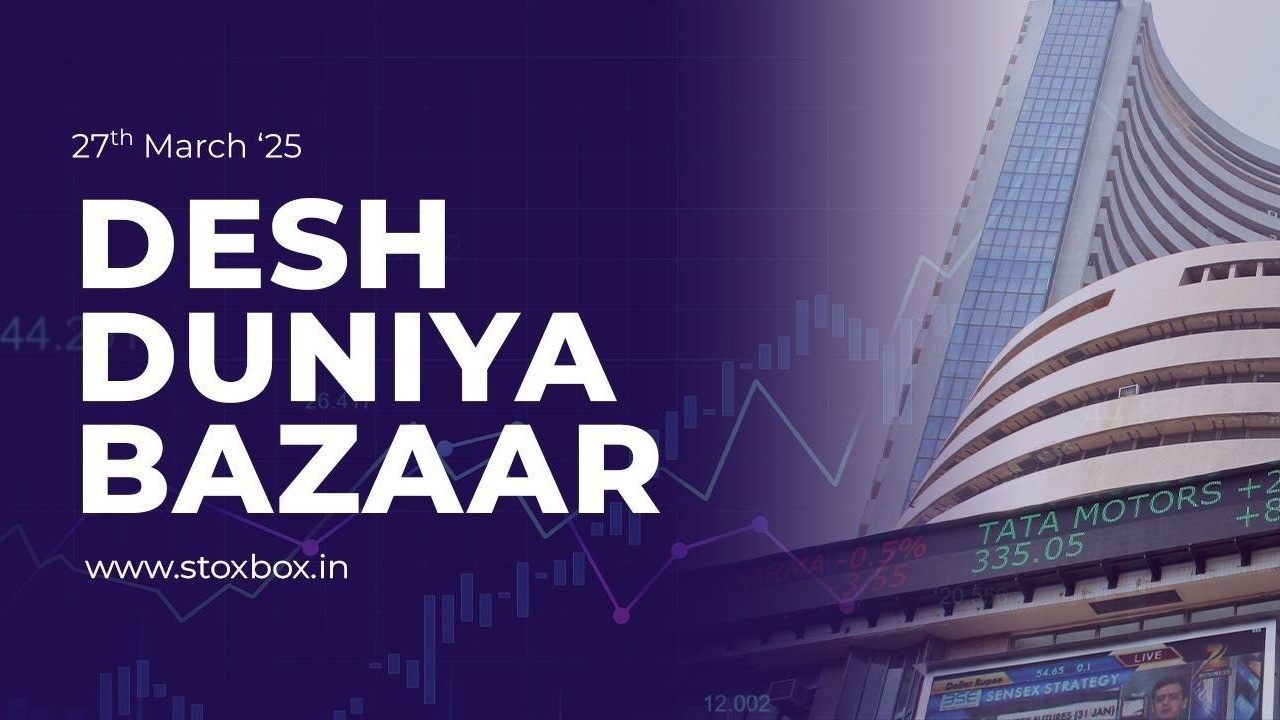JB Chemicals Drops 6%
- 27th March 2025
Aaj Ka Bazaar
The US market lower on Wednesday, as investors expressed concerns over the economic ramifications of the newly announced tariffs. Tech stocks experienced selling pressure amid growing worries about an oversupply of AI data centers and computing capacity. On Thursday, Asian stocks showed mixed results, reflecting the losses seen on Wall Street while investors absorbed US President Donald Trump’s announcement of a 25% tariff on auto imports. The Indian market is expected to open on a sluggish note on Thursday, influenced by Trump’s tariff plan on autos and auto parts set to take effect next week, which has heightened trade tensions and raised concerns about inflation and global growth prospects. The market is likely to trade sideways until the first week of April, with short-term volatility remaining a possibility. Nevertheless, India’s macroeconomic fundamentals remain robust. Increased government spending and improved rural trade dynamics are anticipated to bolster growth, and a potential rate cut by the RBI in April could further enhance market sentiment.
Markets Around Us
BSE Sensex – 77,532.08 (0.32%)
Nifty 50 – 23,528.25 (0.24%)
Bank Nifty – 51,352.60 (0.28%)
Dow Jones – 42,534.92 (0.20%)
Nasdaq – 17,899.01 (-2.04%)
FTSE – 8,689.59 (0.30%)
Nikkei 225 – 37,642.54 (-1.01%)
Hang Seng – 23,712.23 (0.96%)

Sector: Pharmaceuticals
JB Chemicals Dips Sharply
Shares of JB Chemicals dropped over 6% in after a large block deal took place, where 90 lakh shares, or 5.78% of the company’s total equity, changed hands. This caused the stock to hit its biggest single-day fall in four years, trading at ₹1,597 on the NSE. The seller is likely KKR, a global private equity firm and the promoter of JB Chemicals, which holds a 53.66% stake in the company. KKR is reportedly looking to sell around 7% of its stake, with an option to offload an additional 3.5%, aiming to raise up to $300 million. The floor price for the deal is ₹1,625 per share. Investment banks like Kotak Mahindra Capital, Jefferies, IIFL, and Avendus are managing the trade. This move comes after KKR had previously explored exiting the company in 2025 but didn’t close a deal due to valuation issues.
Why it Matters:
The block deal matters because it shows KKR, the main promoter, reducing its stake, which could hint at a change in strategy or confidence. The stock’s sharp fall affects investor wealth and raises concerns about short-term volatility. It also sets the tone for how large pharma stocks may be valued going forward.
NIFTY 50 GAINERS
LARSEN – 3495.00 (2.49%)
SHRIRAM FINANCE– 683.60 (1.73%)
TRENT – 5373.80 (0.97%)
NIFTY 50 LOSERS
TATA MOTORS – 670.95 (-5.27%)
DRREDDY LABS – 1164.60 (-1.06%)
ASIAN PAINTS – 2304.25 (-0.81%)

Sector :Life Insurance
Max Financial Sees ₹569 Cr Stake Shuffle
Max Financial Services came into focus on March 27 after a block deal worth around ₹569 crore took place, involving 51.16 lakh shares or 1.5% of the company’s equity. The shares were traded at an average price of ₹1,112, which is close to the previous day’s closing price. While the exact buyer and seller haven’t been confirmed, reports suggest Max Ventures Investment Holding, part of the promoter group, may be the seller. Some sources estimate the total deal value at ₹611.6 crore, with a floor price of ₹1,117.6 per share. Earlier this week, UBS AG sold 11 lakh shares, which were bought by Integrated Core Strategies (Asia). Brokerage Jefferies remains positive on the stock, citing strong potential from the Axis Bank-Max Life partnership, especially in smaller towns. However, it also flagged regulatory norms around bancassurance as a key factor to watch, as Axis Bank contributes heavily to Max Life’s premiums.
Why it Matters:
This block deal matters because it likely signals a stake reduction by Max Financial’s promoter group, suggesting possible strategic changes within the company. Despite the large transaction, the share price remained stable, reflecting steady investor sentiment backed by the strong Axis Bank-Max Life partnership. However, regulatory developments around bancassurance remain a key area to watch, as they could impact future growth and profitability.

Around the World
Asian currencies saw a small recovery on Thursday as the U.S. dollar weakened slightly, following President Trump’s announcement of a 25% tariff on imported cars and auto parts starting April 2. The US Dollar Index dropped 0.3% to 104.27 but stayed near a three-week high, which limited gains in Asian currencies. Trump’s tariff move is meant to push automakers to produce more in the U.S., but it also raised concerns about global trade tensions and a possible recession, which put pressure on the dollar. As a result, most Asian currencies edged up slightly—Chinese yuan, Japanese yen, South Korean won, Singapore dollar, Philippine peso, Indian rupee, and Indonesian rupiah all saw minor gains. The Australian dollar rose 0.2% after softer inflation data raised hopes of a rate cut. Overall, gains in Asian currencies remained limited due to market uncertainty around upcoming U.S. trade actions and Trump’s unpredictable tariff policy.
Option Traders Corner
Max Pain
Nifty 50 – 23500
Bank Nifty – 51300
Nifty 50 – 23558(Pivot)
Support – 23,380, 23,273, 23,095
Resistance – 23,665, 23,843, 23,949
Bank Nifty – 51384 (Pivot)
Support – 50,893, 50,578, 50,086
Resistance – 51,700, 52,191, 52,506

Have you checked our latest YouTube Video
Did you know?
India’s Retail Investor Surge: Market Participation Hits Record Highs in 2024
India’s stock market has seen a 36% rise in retail participation, with over 50 million investors active by 2024. This surge is driven by increased financial literacy, digital trading platforms, and government initiatives. Systematic Investment Plans (SIPs) have also gained popularity, with monthly contributions hitting ₹14,000 crore in early 2025. These trends reflect growing confidence in India’s equity markets.


